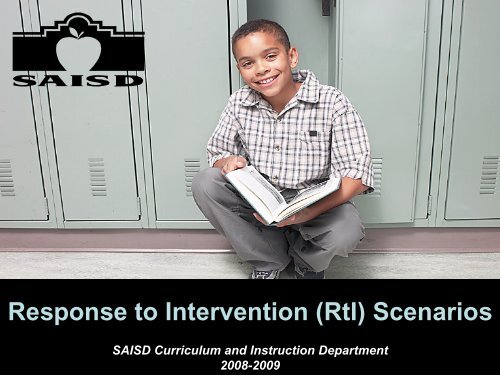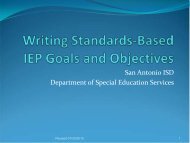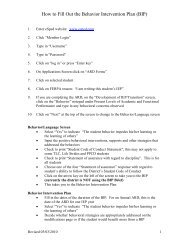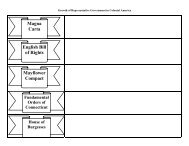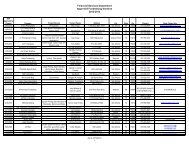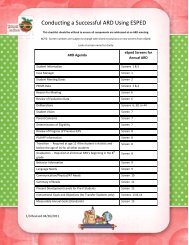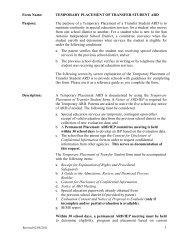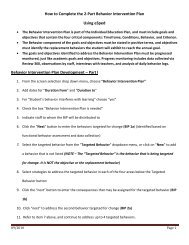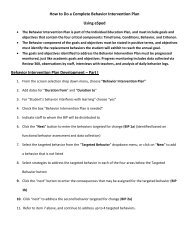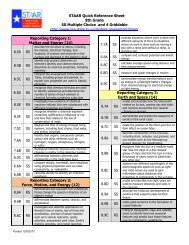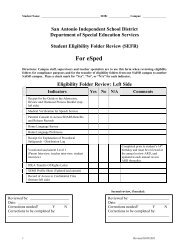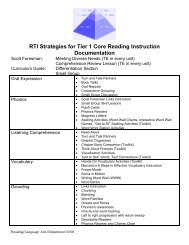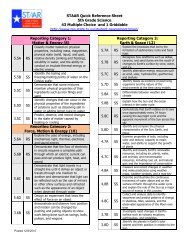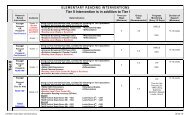RtI Scenarios - San Antonio Independent School District
RtI Scenarios - San Antonio Independent School District
RtI Scenarios - San Antonio Independent School District
Create successful ePaper yourself
Turn your PDF publications into a flip-book with our unique Google optimized e-Paper software.
Response to Intervention (<strong>RtI</strong>) <strong>Scenarios</strong><br />
SAISD Curriculum and Instruction Department<br />
2008-2009
<strong>RtI</strong> Scenario A: Elementary Level<br />
Cecilia is a fifth grader who has never been retained. She lives with her<br />
grandmother. Her mother does not want her, and her father has just been<br />
released from jail. Her eye exam shows she needs glasses; she does not<br />
yet have them. Grandmother states Cecilia was on medication, but the<br />
doctor stopped them. This is Cecilia’s third school since starting school in<br />
kindergarten.<br />
The teacher reports Cecilia can read words, but has a difficult time<br />
comprehending. Additionally, the teacher reports her behavior is disruptive,<br />
especially when she is around her sister. She is most disruptive in P.E.,<br />
music, lunch, and transitional periods. She has better control of her<br />
behavior in the classroom.<br />
She is currently failing all of her subjects. She passed the TAKS reading<br />
test in third grade, but did not pass it in fourth. She failed to pass the TAKS<br />
math in fourth grade. She passed the TAKS Writing test in fourth grade.
<strong>RtI</strong> Scenario A:<br />
Elementary Level<br />
• What do you know? What do<br />
you still need to know?<br />
• What do you believe is the core<br />
problem?<br />
• Should teacher proceed with<br />
the <strong>RtI</strong> process?<br />
• If yes, what Curriculum<br />
Guide Evidence/supporting<br />
documentation does teacher<br />
need to present at Tier I?<br />
• Who needs to be on the <strong>RtI</strong><br />
Team?
<strong>RtI</strong> Scenario B: Elementary Level<br />
Frank is a third grader who has never been retained. He lives with both<br />
parents. He demonstrates no medical problems. Frank has attended the<br />
same school since Pre-K. Frank’s teacher reports he is having problems<br />
with reading; he is not meeting the district’s reading expectations. He can<br />
read most words, but struggles decoding those he does not know. His<br />
fluency rate is low, and he struggles with comprehension. Currently, Frank<br />
is struggling in mathematics and spelling.<br />
Frank met all reading expectations in kindergarten and first grade, but<br />
lagged behind until the end of the year. He progressed to the third grade<br />
despite failing to meet all expectations on the second grade TPRI.<br />
Currently, his third grade graphophonemic scores range from 0 – 2/5. He<br />
is struggling with Grade 3 story 1, reading at a frustrational level. His<br />
fluency rate is 46.<br />
Frank does well with computation skills, but fails to be successful when<br />
given word problems to solve. Simple computation sheets seem to be<br />
when Frank scores the highest in mathematics. With modified spelling lists,<br />
Frank is still not successful. He struggles spelling basic third grade words,<br />
and at times, misspells common sight words.
<strong>RtI</strong> Scenario B:<br />
Elementary Level<br />
• What do you know? What do<br />
you still need to know?<br />
• What do you believe is the core<br />
problem?<br />
• Should teacher proceed with<br />
the <strong>RtI</strong> process?<br />
• If yes, what Curriculum<br />
Guide Evidence/supporting<br />
documentation does teacher<br />
need to present at Tier I?<br />
• Who needs to be on the <strong>RtI</strong><br />
Team?
<strong>RtI</strong> Scenario C: Elementary Level<br />
Eduardo is a bilingual student who was referred for dyslexia testing in<br />
April 2007 as a first grade student. He did not qualify for dyslexia but was<br />
recommended for Tier III intervention to build decoding skills that would<br />
help him decode longer words. It was indicated that Tier III would also aid<br />
in building vocabulary and reading comprehension. The dyslexia<br />
evaluation summary further recommended that the student be exposed to<br />
activities that would increase attention span so that he would be able to<br />
complete requested tasks since Eduardo had a great deal of difficulty<br />
following directions. He would frequently interrupt the evaluator before<br />
she was finished explaining what was expected of him. On the writing<br />
test, in particular, he attempted to go ahead on his own, rather than wait<br />
for the verbal prompt that went with the picture prompt. He would also<br />
attempt to distract the evaluator from the testing by changing the subject.<br />
His teacher reports that the student is now labeled with a reading<br />
disability and would like for the ARD Committee to consider retesting him<br />
for dyslexia eligibility since he was six years old the last time he was<br />
evaluated. The student also exhibits articulation difficulties and his<br />
teacher is requesting speech assessment.
<strong>RtI</strong> Scenario C:<br />
Elementary Level<br />
• What do you know? What do<br />
you still need to know?<br />
• What do you believe is the core<br />
problem?<br />
• Should teacher proceed with<br />
the <strong>RtI</strong> process?<br />
• If yes, what Curriculum<br />
Guide Evidence/supporting<br />
documentation does teacher<br />
need to present at Tier I?<br />
• Who needs to be on the <strong>RtI</strong><br />
Team?
<strong>RtI</strong> Scenario D: Elementary Level<br />
A kindergarten student with spina bifida has transferred into your campus.<br />
Samuel is using a diaper and will need assistance to change his soiled<br />
diaper. The school nurse is teaching Samuel to use a pull-up instead. Up<br />
until late summer, Samuel used a walker to move around. He has been<br />
learning to walk around without it but may sometimes lose his balance.<br />
Samuel is bright. He knows letter names and their corresponding sounds,<br />
days of the week, colors, shapes, and how to spell and write his name.<br />
According to TPRI documentation, he met expectations on BOY screening.<br />
Samuel makes friends easily. His mother has repeatedly mentioned that<br />
Samuel would do better in school if an assistant were assigned to be with<br />
him during the school day. His mother is disabled and unable to bring him<br />
to school. Samuel has an older brother in second grade who is an honor<br />
student and two younger siblings at home.
<strong>RtI</strong> Scenario D:<br />
Elementary Level<br />
• What do you know? What do<br />
you still need to know?<br />
• What do you believe is the core<br />
problem?<br />
• Should teacher proceed with<br />
the <strong>RtI</strong> process?<br />
• If yes, what Curriculum<br />
Guide Evidence/supporting<br />
documentation does teacher<br />
need to present at Tier I?<br />
• Who needs to be on the <strong>RtI</strong><br />
Team?
<strong>RtI</strong> Scenario E: Middle <strong>School</strong> Level<br />
Maria is a seventh grader who lives with her mother. She attended the<br />
same elementary school from kindergarten through fifth grade. She has<br />
attended this middle school since the start of sixth grade. She has no<br />
known medical problems.<br />
The seventh grade team reports that Maria started the year with a negative<br />
attitude. An investigation of sixth grade shows she was quiet and<br />
cooperative until March, when she began accumulating discipline referrals.<br />
At that time, she began to refuse to complete classroom assignments,<br />
choosing to put down her head instead. This year, Maria began the year<br />
more confrontational. She continues to refuse to complete classroom/<br />
homework assignments. Her refusals are now verbal confrontations with<br />
the teachers. Teachers have not had an opportunity to meet with Maria’s<br />
mother, as she works. To date, Maria has been sent to ISS four times and<br />
has been suspended twice.<br />
Academically, Maria has had marginal grades in all of her core subjects<br />
since first grade. She has never passed the TAKS tests in any subject.<br />
She attended after-school tutoring classes in the second and third grades.<br />
There are no known interventions noted for fourth through sixth grade.<br />
Currently, Maria refuses to attend tutoring before or after school.
<strong>RtI</strong> Scenario E:<br />
Middle <strong>School</strong> Level<br />
• What do you know? What do<br />
you still need to know?<br />
• What do you believe is the core<br />
problem?<br />
• Should teacher proceed with<br />
the <strong>RtI</strong> process?<br />
• If yes, what Curriculum<br />
Guide Evidence/supporting<br />
documentation does teacher<br />
need to present at Tier I?<br />
• Who needs to be on the <strong>RtI</strong><br />
Team?
<strong>RtI</strong> Scenario F: Middle <strong>School</strong> Level<br />
Sergio is an ELL sixth grader new to the United States in January of<br />
last year. He lives with his mother and father. He has no known<br />
medical problems. He attended school in Mexico for four years.<br />
Sergio is a pleasant, cooperative young man who is struggling in all<br />
of his classes. His English reading level is second grade, and he is<br />
making almost no progress in his conversational English. While he<br />
makes an effort in mathematics, he cannot work independently. His<br />
teachers feel he must have a reading problem that is interfering with<br />
learning to read English and therefore unable to complete the<br />
assignments/exams in his other content areas.<br />
Sergio is failing all of his core subjects. He was exempt from the<br />
TAKS test in fifth grade. His Woodcock Muñoz shows fluency in<br />
Spanish. An analysis of his Spanish writing and reading shows he<br />
lags behind a typical sixth grader, but only by a year.
<strong>RtI</strong> Scenario F:<br />
Middle <strong>School</strong> Level<br />
• What do you know? What do<br />
you still need to know?<br />
• What do you believe is the core<br />
problem?<br />
• Should teacher proceed with<br />
the <strong>RtI</strong> process?<br />
• If yes, what Curriculum<br />
Guide Evidence/supporting<br />
documentation does teacher<br />
need to present at Tier I?<br />
• Who needs to be on the <strong>RtI</strong><br />
Team?
<strong>RtI</strong> Scenario G: High <strong>School</strong> Level<br />
Catherine is an seventeen year old student who has earned<br />
credits to classify her as a sophomore. This is her third high<br />
school since the start of her freshman year. She was retained<br />
in the sixth grade. She currently lives with her father.<br />
Catherine continues to fail ELA, Science, and Social Studies.<br />
She has not passed the TAKS tests, from sixth grade to<br />
present. An SST was started on her in the fifth grade, but<br />
there was no follow-up once she moved to middle school.<br />
Catherine is a quiet young lady who converses with her small<br />
group of friends. She is not involved in any before or after<br />
school activities. All of her teachers report that she is<br />
cooperative and quiet, but none know her well.
<strong>RtI</strong> Scenario G<br />
High <strong>School</strong> Level<br />
• What do you know? What do<br />
you still need to know?<br />
• What do you believe is the core<br />
problem?<br />
• Should teacher proceed with<br />
the <strong>RtI</strong> process?<br />
• If yes, what Curriculum<br />
Guide Evidence/supporting<br />
documentation does teacher<br />
need to present at Tier I?<br />
• Who needs to be on the <strong>RtI</strong><br />
Team?
<strong>RtI</strong> Scenario H: High <strong>School</strong> Level<br />
Gerald is a tenth grade transfer student from another high school in the<br />
district. He is 17 years old. Gerald attended three elementary schools and<br />
two middle schools. He currently lives with his aunt and uncle. Gerald<br />
wears glasses, when he remembers. Gerald qualifies for Section 504; his<br />
disability is diabetes.<br />
A review of Gerald’s attendance shows he has 30 unexcused and 3<br />
excused absences as of March. He is currently failing ELA, math, and<br />
science. When asked about his strengths and weaknesses, his teachers<br />
state he is absent too much to really know. When in class, Gerald is quiet.<br />
He does not turn in assignments. Teachers cannot state whether his<br />
current 504 accommodations are appropriate because he is not in class<br />
consistently enough to implement them.<br />
Gerald passed the TAKS Reading and Math tests in seventh grade. Since<br />
that time, he has failed to pass the TAKS. He has not taken any<br />
companion courses to address the failures. Although tutoring classes are<br />
available after school, Gerald does not attend.<br />
There have been no parent/teacher conferences with Gerald’s aunt or<br />
uncle.
<strong>RtI</strong> Scenario H:<br />
High <strong>School</strong> Level<br />
• What do you know? What do<br />
you still need to know?<br />
• What do you believe is the core<br />
problem?<br />
• Should teacher proceed with<br />
the <strong>RtI</strong> process?<br />
• If yes, what Curriculum<br />
Guide Evidence/supporting<br />
documentation does teacher<br />
need to present at Tier I?<br />
• Who needs to be on the <strong>RtI</strong><br />
Team?
<strong>RtI</strong> Reminders<br />
• <strong>RtI</strong> is a team PROBLEM-<br />
SOLVING process.<br />
• <strong>RtI</strong> starts with the practice<br />
and provision of highquality<br />
instruction through<br />
implementation of SAISD<br />
Curriculum Guides at<br />
Tier I for ALL students.<br />
• <strong>RtI</strong> teacher focus should<br />
be on WHAT and HOW<br />
the student is doing, not<br />
WHERE the student will<br />
receive the intervention.
<strong>RtI</strong> Questions?<br />
Refer to……………….<br />
• <strong>RtI</strong> Flow Chart and/or ;<br />
• <strong>RtI</strong> Plan Step by Step<br />
Directions and <strong>RtI</strong> Plan<br />
and/or;<br />
• <strong>RtI</strong> FAQ and/or;<br />
• Contact your campus<br />
<strong>RtI</strong> Coordinator (CIC).


